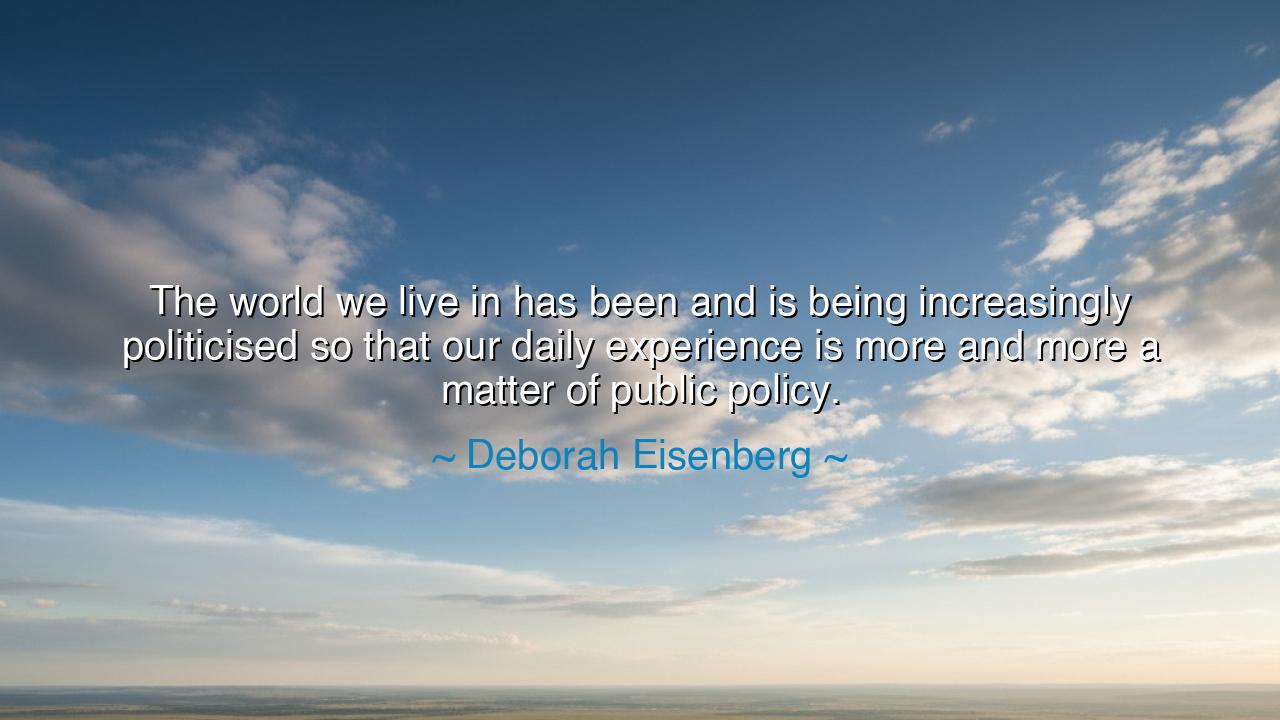
The world we live in has been and is being increasingly
The world we live in has been and is being increasingly politicised so that our daily experience is more and more a matter of public policy.






“The world we live in has been and is being increasingly politicised so that our daily experience is more and more a matter of public policy.” Thus spoke Deborah Eisenberg, the modern chronicler of human conscience, whose words carry the quiet gravity of one who has watched the tides of society turn and the private soul become entangled in the machinery of the state. Her observation is neither bitter nor resigned — it is a lament and a warning, a recognition that the delicate boundary between the personal and the political has thinned almost to vanishing. In her voice, we hear the cry of an age in which even the simplest acts of living — eating, working, breathing — are shaped by forces beyond our choosing.
The origin of this insight lies in the shifting nature of modern civilization. Once, the individual dwelled in small communities, governed more by custom and conscience than by law. The marketplace, the family, and the temple existed in harmony with the rhythms of life. But as the centuries turned, and empires rose, the reach of governance grew ever deeper. Today, every breath of air, every glass of water, every word spoken through the ether of the internet is touched by policy. To be alive in such an age is to live not merely as a citizen, but as a subject of countless unseen decisions — decisions that shape the food we eat, the wages we earn, the freedom we feel.
Eisenberg’s words echo the wisdom of the ancients, who knew that power, once expanded, seldom retreats. Aristotle taught that man is by nature a political animal, for he cannot live without community. Yet even he could not have imagined an age where the polis would stretch its reach into every corner of private existence. What was once the realm of shared deliberation has become the air we breathe — invisible yet omnipresent. The act of living, Eisenberg reminds us, has become an act of politics. Whether we buy bread, choose medicine, or turn on a light, we are participating in systems of governance that reward some, deprive others, and define the very shape of our daily experience.
Consider the story of Rachel Carson, the biologist and writer who, in the mid-twentieth century, uncovered the deadly consequences of pesticide use in her book Silent Spring. Before her revelation, few saw a connection between public policy and the singing of birds, between chemical regulation and the quiet of meadows. But Carson revealed that the destruction of nature was not a distant concern — it was the direct result of political choices, hidden beneath the comfort of modern convenience. Her courage awakened a generation, showing that the fate of every living thing is bound to the decisions of those who govern. Like Eisenberg, she taught that no part of life remains untouched by policy — even the whisper of wind through the trees carries its imprint.
In our age, the same truth deepens. The digital world, once imagined as a realm of liberation, has become another arena of surveillance and control. What we read, what we share, even what we desire, can be shaped by algorithms and laws we did not write. Our daily experience, Eisenberg says, is not entirely our own — it is filtered through structures of power that operate quietly, persistently, and often invisibly. The personal has become political not through choice, but through necessity. To be aware of this is the beginning of wisdom; to ignore it is to live unknowing within the labyrinth of policy.
Yet her words are not merely an elegy for lost freedom — they are a call to consciousness. For if every part of life is now touched by politics, then every action, however small, becomes an opportunity for agency. To eat ethically, to vote mindfully, to speak truth in the public square — these are acts of resistance and renewal. Just as public policy shapes the individual, so too can the individual shape public policy. Awareness becomes the weapon against apathy; participation becomes the antidote to control. The ancients would call this the virtue of the citizen-sage — the one who lives not in ignorance of the world’s machinery, but in wise harmony with it.
The lesson, then, is clear: the world is no longer divided between public and private, between the grand stage of politics and the quiet theater of the heart. They are one and the same. To live well is to live consciously — to know that every choice has consequence, that every silence has weight. The wise must neither retreat from the world nor be consumed by it, but instead walk the narrow bridge between freedom and responsibility.
Therefore, my friends, let us heed Eisenberg’s words. Let us not drift as leaves upon the current of policy, but become the hands that steer the river. Let us remember that the price of peace, justice, and truth is eternal attention. For though the world may grow ever more politicized, the soul that remains awake — guided by compassion, by knowledge, and by courage — can still shape the destiny of nations. In this lies our hope: that even in a world of laws and powers, the human heart, if it stays true, remains the most potent force of all.






AAdministratorAdministrator
Welcome, honored guests. Please leave a comment, we will respond soon